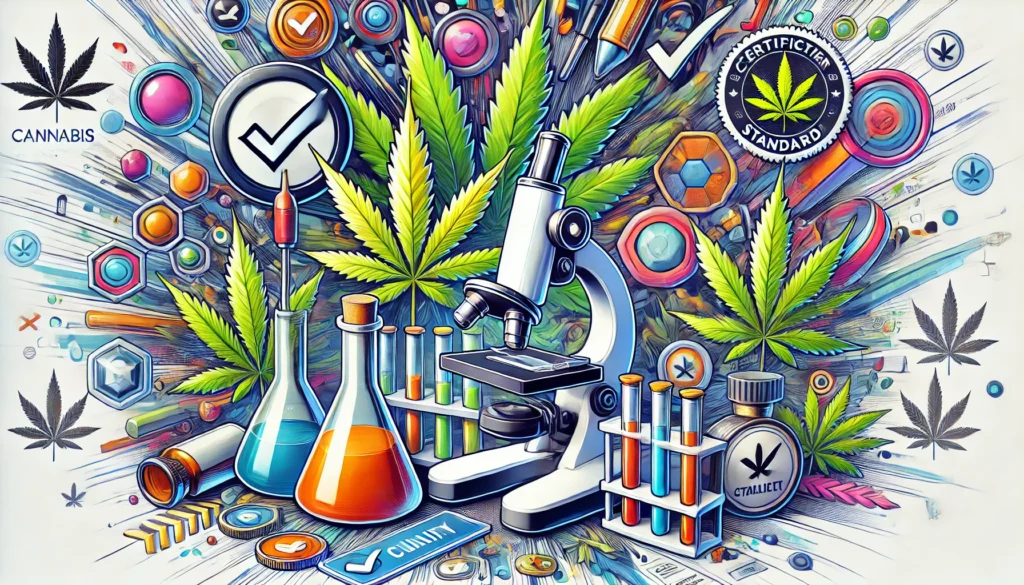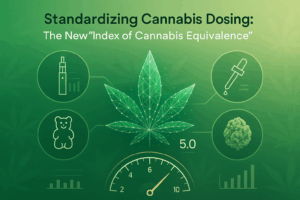Medicinal cannabis may be a global sensation, but navigating the industry often feels like solving a riddle. You’ve probably asked yourself, “What are the standards for medicinal cannabis?” The answer, it turns out, depends entirely on where you’re standing. One country’s «strictly regulated» might be another’s «we’ll figure it out later,» leaving buyers both curious and cautious.
In this blog, we’ll take you on a fun, fact-filled journey through the fascinating world of medicinal cannabis standards. From Europe’s no-nonsense approach to North America’s patchwork rules and Asia’s emerging markets, you’ll get the inside scoop on what it takes to stay compliant. So buckle up—it’s time to navigate the global maze of cannabis compliance!
The Role of EU GMP Standards in Ensuring Medicinal Cannabis Quality
When it comes to medicinal cannabis, quality isn’t just a buzzword—it’s everything. Whether you’re a licensed buyer, manufacturer, or distributor, ensuring your product meets the highest standards is non-negotiable. That’s where EU GMP (Good Manufacturing Practices) comes into play. These aren’t just guidelines—they’re the gold standard of quality, safety, and consistency in medicinal cannabis production. Let’s dive into why EU GMP matters and how it helps you.
What Exactly Are EU GMP Standards?
Think of it like a playbook that ensures every batch of medicinal cannabis you buy or sell is safe, effective, and consistent. That’s EU GMP in a nutshell. These standards cover every step of the production process—from cultivation to packaging—with strict rules to ensure quality.
For medicinal cannabis, EU GMP is not optional; it’s a requirement in many European countries. It ensures that products are free from contaminants like pesticides, heavy metals, and microbes. Plus, it standardizes the levels of cannabinoids and terpenes, so you get exactly what you expect. Think of it as your ultimate quality assurance badge.
How EU GMP Ensures Consistency and Safety
Let’s face it-nobody gets a kick out of surprises when it comes to medicinal cannabis, neither the manufacturer nor the supplier. And for consistency, EU GMP enforces a tightly controlled production environment where every batch has to match the last. To give an example, cultivation is done under strictly regulated temperature and humidity conditions, and even the light used is put under scrutiny.
But safety is where EU GMP really shines. Every product is tested rigorously at multiple stages of production for residues, microbial contamination, and potency levels. With EU GMP, you can be sure your product is safe and effective.
Here’s a fun fact: EU GMP-certified facilities don’t just meet minimum standards; they go way over the top. They’re being inspected all the time for this cause, and if anything very minor slips up, away goes your certification. All this keeps the producers at the edge to produce something worthy for you.
Why Licensed Buyers Should Care About EU GMP
Why should you, the buyer or distributor, have to care about EU GMP standards? Because it is your reputation on the line. Imagine having to sell a batch of cannabis that doesn’t make the quality standard. Your clients won’t just lose trust in the product; they will lose it in you.
EU GMP certification acts as a seal of trust. It tells your clients, «This product meets the highest standards of quality and safety.» It also simplifies your compliance with local and international regulations. Many European countries require EU GMP certification for medicinal cannabis imports, so having it can open doors to larger markets.
Plus, it saves you from future headaches. Products that don’t meet EU GMP standards can face recalls, fines, or even legal action. When you choose EU GMP-certified cannabis, you’re not just buying a product-you’re buying peace of mind.
The Bigger Picture: Building Trust in Medicinal Cannabis
The medicinal cannabis market is growing, but skepticism is also on the rise. Patients and healthcare professionals want to know they are using products that are safe and effective. EU GMP standards are game-changing in this regard-they help build confidence in the industry.
By following EU GMP, producers and suppliers signal their commitment to quality. This helps further normalize medicinal cannabis as a reliable treatment option. Whether it’s pain management, epilepsy, or other conditions, patients can feel confident in their treatments when they know EU GMP standards are in place.
EU GMP standards are far more than a regulatory hoop one jumps through; they constitute the backbone of medicinal cannabis quality. They ensure the product is consistent, safe, and compliant, giving an edge in the market.
Now, the next time you do your sourcing of medicinal cannabis, look for that European Union GMP badge, because it is not just another certificate-it’s a promise of excellence. And what better can one ask?
Quality Testing for Medicinal Cannabis: Potency, Purity, and Contaminants
For medical marijuana, quality testing isn’t merely part of the process; it is a touchstone to success and faith. When buying a license, acting in pharmaceutical interests, or as a distributor-one needs to comprehend, firstly, exactly what product, under an accredited standard regarding potency, purity, and safety one deals with. In order not to break off our further description, let’s outline just why such tests matter to make certain each product measures up.
Why Potency Testing Matters: It’s All About Consistency
Imagine buying a medicinal cannabis product expecting one potency level and getting something quite different. That’s not just an inconvenience; that’s risk. Potency testing is the process of measuring the concentration of cannabinoids, including THC and CBD, so every batch delivers exactly what the label promises.
For medicinal cannabis, consistency isn’t a luxury-it’s a necessity. Patients rely on precise doses for effective treatment, and any deviation can impact results. Potency testing eliminates guesswork to help you and your clients trust the product every time.
Think about it: would you trust a pharmaceutical pill with «approximately» the right dose? Of course not! Medicinal cannabis deserves the same level of precision. Potency testing ensures it.
Purity: Keeping the Product Clean and Safe
Cannabis may be natural, but that does not mean it is automatically pure. Purity testing ensures the product is free from unwanted substances like heavy metals, pesticides, and microbial contamination. These contaminants aren’t just unpleasant-they can be downright harmful.
For example, pesticides used during cultivation can be present in the final product even after processing. Heavy metals like lead or mercury can enter through soil or water. Purity testing identifies these risks before the product ever reaches the market.
And, of course, microbial contamination: bacteria, mold, or yeast. Invisible they may be, but none the less serious threats to product safety. Purity testing for invisible threats provides for a clean product that is safe to use.
The bottom line? Purity testing safeguards your clients, your business, and your reputation. When you sell a product guaranteed pure, you’re selling more than cannabis-you’re selling peace of mind.
Contaminants: Catching the Invisible Threats
Contaminants are the uninvited guests of the cannabis world. You can’t see them, yet they are there, either lurking in the soil, water, or even in the air. That’s why testing for contaminants is one of the important points of quality assurance.
The most common culprits for this include cadmium, arsenic, and lead. These toxic elements are absorbed into the cannabis plants by either the soil or fertilizer. Consuming even trace amounts can be dangerous, especially for patients with compromised immune systems.
That’s not all: pesticides and herbicides used to protect crops can reside in the plant and make their way into the final product. Even the smallest amount can cause allergic reactions or worse. Contaminant testing makes sure these substances are detected and removed prior to the product being sold.
Let’s not forget residual solvents. These are chemicals left behind from the extraction process. While solvents like ethanol or butane are used in the extraction of cannabinoids, they shouldn’t be part of the final product. Testing makes sure they’re reduced to safe levels-or eliminated altogether.
The Testing Process: How It All Works
So, how is medicinal cannabis tested for potency, purity, and contaminants by labs? It’s a painstakingly precise process that melds science and precision together. Specialized laboratories run advanced techniques, such as high-performance liquid chromatography (HPLC) and mass spectrometry to analyze samples.
Lab tested for potency by measuring concentrations of THC, CBD, and other cannabinoids. Laboratories will then investigate the terpene profile involved: Terpene is a factor impacting the product’s aroma and therapeutic effects. Purity testing involves searching for some harmful substances like pesticides, heavy metals, and microbes.
To complete this, contaminant testing goes even further to turn up invisible risks and keep products in line with the local regulations. Every phase is designed to ensure consistency, quality, and the safety of the product itself.
Why Quality Testing Is Your Competitive Edge

When you sell medicinal cannabis that’s been thoroughly tested, you’re offering more than just a product—you’re offering trust. Clients can rely on you to provide safe, consistent, and effective cannabis every time. That’s not just a selling point—that’s a competitive edge.
Testing will also keep you in compliance with regulations, especially in strict markets like Europe. By investing in high-quality testing, you’re not just meeting requirements-you’re exceeding expectations.
Quality testing for medicinal cannabis is non-negotiable. Potency ensures every dose is effective, purity guarantees safety, and contaminant testing catches hidden dangers. Whether you’re a buyer or a distributor, understanding these tests is key to offering products that clients trust.
With quality testing, you go beyond compliance; you differentiate yourself. The next time you procure medicinal cannabis, ask for the lab results. They are not just numbers; they are proof of excellence.
Certifications and Compliance: What Licensed Buyers Should Look For
Buying medicinal cannabis from a certified, compliant supplier is the ultimate insurance for your business. More than mere fancy papers on the wall, certifications are your assurance-proof that every batch passes all aspects of safety, quality, and legal standards. For a licensed buyer, knowing what you’re looking for can all make a difference. So let’s break it down to get you navigating the maze with ease concerning certifications and compliance.
Why Certifications Matter in Medicinal Cannabis
Imagine walking into a store and picking up a product without knowing if it’s safe or reliable. Sounds risky, right? That’s why certifications in medicinal cannabis are so crucial—they offer transparency and assurance in a regulated but evolving industry.
For licensed buyers, certifications like EU GMP or ISO 9001 mean the producer isn’t cutting corners. Such a certificate means that all steps, from cultivation to packaging, follow strict quality and safety guidelines. They act as a guarantee that the product is free of contaminants and consistent in potency.
Think of certifications as the industry’s way of saying, «We’ve got this.» They save you from unpleasant surprises and let you focus on what matters-helping your clients.
EU GMP: The Gold Standard for Quality
If you are targeting the European market, then EU GMP certification is not up for discussion. It is considered by many to be the gold standard for medicinal cannabis quality. But what does it mean?
EU GMP certification ensures every single aspect of the manufacturing process-from growing, processing, testing, and right to its packaging-meets stringent safety and consistency standards to ensure that each and every batch is identical with regard to potency, purity, and quality.
For you, as a buyer, this means you’re getting a product that healthcare professionals and patients can trust. EU GMP-certified cannabis is ideal for pharmaceutical applications, where precision is critical. Plus, many European countries require this certification for imports, so having it makes your life a whole lot easier.
ISO Standards: Another Layer of Confidence
While EU GMP is huge in cannabis, ISO certificates shouldn’t be ignored. These standards cover everything from production to quality management processes. For example, ISO 9001 focuses on consistent quality management systems, while ISO 22000 covers food safety, which can apply to cannabis edibles and extracts.
ISO certifications demonstrate that a producer follows globally recognized best practices. This is particularly valuable if you’re sourcing from international suppliers. It’s like a universal language for quality—you know the producer is serious about their processes.
The more certifications that a supplier has, such as EU GMP and ISO, the better. You will have extra assurance that the product is not only safe but also manufactured by well-documented and reliable systems.
Importance of Compliance to Local Regulations
But it’s just one piece of the puzzle: compliance with local laws and regulations is just as critical. Medicinal cannabis is a highly regulated product, and every market is different. Germany might have different documentation requirements compared to the UK or Canada.
Whenever sourcing, always ask your supplier about his or her compliance with local laws. Do they have the proper import/export licenses? Are they registered with the relevant authorities? A supplier who can say «yes» to both of these questions is gold.
Compliance isn’t just about staying out of fines or litigation; it’s about creating a product that can enter the market with ease and poise. And, if you are frank, it is not nice getting entangled in regulatory red tape.
Questions Every Licensed Buyer Should Ask
- To make sure you’re covering all your bases, here are a few key questions to ask your supplier:
- What certifications do you have? Look for EU GMP, ISO, or country-specific certifications.
- Are you compliant with local and international regulations? This helps in smooth import/export and distribution.
- Do you provide a COA per batch? The COA is a document proving the product meets the quality standard.
- How often does an audit or inspection of your facility take place? More frequent inspections mean the supplier keeps up to date on compliance.
- If a supplier can confidently answer these questions, you’re on the right track.
Certifications and compliance are your safety net in the world of medicinal cannabis. They protect your business, your clients, and your reputation. EU GMP, ISO certifications, and adherence to local laws aren’t just technicalities—they’re the foundation of a trustworthy supply chain.
But when you choose a certified, compliant supplier, you aren’t just buying a product; you are buying reliability, quality, and peace of mind. So the next time you’re sourcing medicinal cannabis, don’t just ask about price or potency; ask about the certifications, compliance, and processes behind the product. Because in this industry, it’s what you can’t see that makes all the difference.
Differences in Medicinal Cannabis Standards Across Europe and the World
Medicinal cannabis may finally be gaining momentum worldwide, but one thing is for sure-it’s far from being a one-size-fits-all market. Every country seems to have its own rulebook, and navigating them is pretty tricky for licensed buyers. Understanding these differences between Europe’s strict quality standards and looser guidelines elsewhere will make or break a company in this space. Take a trip with me around the world of medicinal cannabis standards, and let’s see what makes each region different.
Europe: The Land of Strict Standards and Certifications
If you’re selling or buying medicinal cannabis in Europe, brace yourself for some of the strictest standards on the planet. European markets, especially Germany, require EU GMP (Good Manufacturing Practices) certification. This is the gold standard for quality and safety, ensuring consistency in potency, purity, and compliance.
It is about patient safety, and the high standards expected from any product sold within Europe – free from contaminants, precisely dosed, and traceable from seed to shelf. For you, the buyer, this means less guesswork, more confidence in your supply chain; but it also means working with suppliers who go the extra mile to meet rigorous requirements.
Germany, the largest medicinal cannabis market in Europe, sets the tone. It requires all imported cannabis to meet pharmaceutical-grade standards, which includes EU GMP certification. Countries like the UK and the Netherlands also adhere to strict regulations but may have slight differences in documentation or import rules. If you’re entering the European market, prepare to check every box.
North America: A Tale of Two Countries
When it comes to medicinal cannabis standards, North America is a mixed bag. The United States, while a powerhouse in the world of cannabis, has a patchwork of state-specific regulations. There’s no federal standard for medicinal cannabis quality, meaning what’s legal and compliant in California might not be in Texas.
For licensed buyers, this can be both an opportunity and a headache. States like California, Colorado, and Massachusetts have stringent testing requirements for potency and contaminants. But because federal oversight is lacking, consistency can be hit or miss. If you’re sourcing from the U.S., it’s crucial to vet your suppliers carefully.
Canada, on the other hand, works on the basis of a national medicinal cannabis framework. Its requirements are strict but a bit more flexible than those in Europe. Licensed producers have to follow GPP practices that ensure cleanliness, product safety, and record-keeping in Canada. While not as detailed compared to EU GMP, its GPP-certified products are of high quality and globally well-received.
Australia: A Growing Market with a European Influence
Australia is another player in the medicinal cannabis market, and its standards lean heavily towards the European model. Products must meet Therapeutic Goods Administration (TGA) requirements, which are similar to EU GMP. This ensures that cannabis products are pharmaceutical-grade and safe for patients.
For exporters and distributors, Australia’s alignment with European standards is a plus. If you’re already meeting EU GMP requirements, you’re likely to tick all the boxes for Australian compliance too. However, Australia’s market is still growing, so keep an eye on evolving regulations.
Asia: Emerging Markets, Varied Standards
From the newest players in the medicinal cannabis industry, Asia has very inconsistent standards. Thailand, which has legalized medicinal cannabis, was the first to set up a framework for its cultivation and export. Its standards are still in the process of development, however, and thus consistency can be an issue.
China, while a major producer of hemp, has not fully embraced medicinal cannabis. Regulations remain strict, and the focus is more on industrial applications than medical-grade products. If you’re exploring Asian markets, understanding the specific rules in each country is essential.
The Global Takeaway: Adaptability Is Key
The biggest takeaway when it comes to global medicinal cannabis standards? Be adaptable. Whether you’re targeting Europe’s pharmaceutical-grade market, North America’s patchwork regulations, or Asia’s emerging opportunities, knowing the rules is half the battle.
For licensed buyers, it could be easier to work with suppliers who meet multiple certifications, such as EU GMP and Canada’s GPP. These all tend to be a common language of quality that make life easier no matter where in the world you operate.
While medicinal cannabis standards may vary the world over, one thing stands constant: quality and compliance. Europe leads the way with its pharmaceutical-grade standards, while North America brings opportunity in a sea of regulation chaos. Australia is catching up, with its EU-inspired framework now in place, while Asia is still finding its footing.
Understanding these differences isn’t just about following the rules but about building trust with your clients and patients. Whether sourcing for Germany, California, or Thailand, make sure your suppliers are up to the task. In the world of medicinal cannabis, quality is the ultimate currency.




